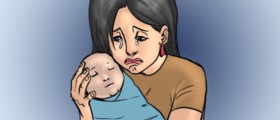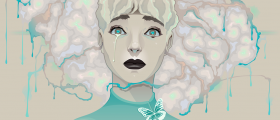
Postpartum depression, also defined as postnatal depression, is a serious illness which affects mothers in the first few months afterwards childbirth. Postnatal depression influences up to 15 percent of new mothers. It may occur among fathers as well, but that rarely happens. The signs of postpartum depression can last for months. In some cases, a woman may have postpartum psychosis which is defined by homicidal and suicidal thoughts, hallucinations, disorganized and bizarre thinking. Once a woman has had a postpartum episode, the risk of developing it again is almost 30- 50%. Previously, it is thought that this type of depression is caused by a lack of vitamins, but new surveys show that more probable causes are the significant changes in hormone levels.
A woman has a higher possibility to develop postpartum depression if she has had a lot of tension in her life, if she has a sick or colicky baby, or if she does not have enough support from her partner, family or friends. Women under the age of 20 are at higher risk, along with the women who did not plan pregnancy or do not want it. Sometimes, a previous mental illness, such as bipolar disorder, schizophrenia or autism may be a source of developing postnatal depression. Doctor can diagnose it by asking the woman about the symptoms. She will do a physical test. The treatment usually includes counseling, antidepressants and hormone therapy. Counseling includes talking to a therapist, psychologist or a social worker because it may help in dealing with the problems. Antidepressants can be very helpful in treating postnatal depression. There are many medications that can be used even if the mother is breastfeeding. Breastfeeding is good for mother and her baby, both physically and emotionally. Selective serotonin reuptake inhibitors (SSRIs) are often advised for treating this type of depression. They are very efficient in most women, with fewer unwanted effects than tricyclics. Tricyclics have not resulted in any known breast-feeding baby problems.
Moreover, they are not passed on to a breastfeeding baby in measurable amounts. Antidepressants are usually used for 6 months. In some cases, the hormone "estrogen" substitute therapy helps a lot with treating postpartum depression. This therapy will not probably become a common treatment for PPD, because it enlarges the risk of blood clots, and endometrial cancer. Postnatal depression is a common condition, but it is frequently an overlooked disorder. Successful treatment of PPD needs early identification and intervention.

















Your thoughts on this
Loading...